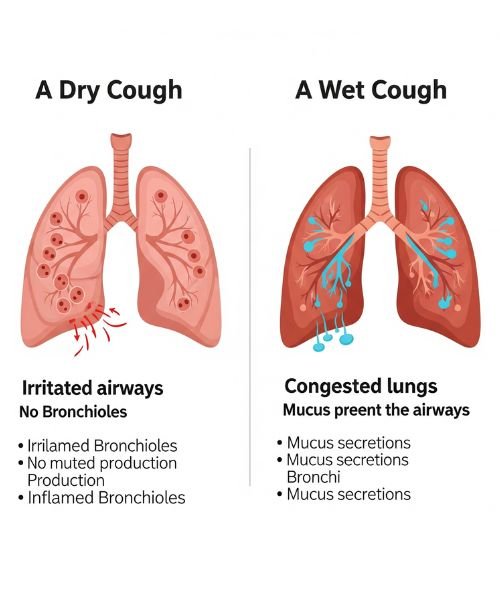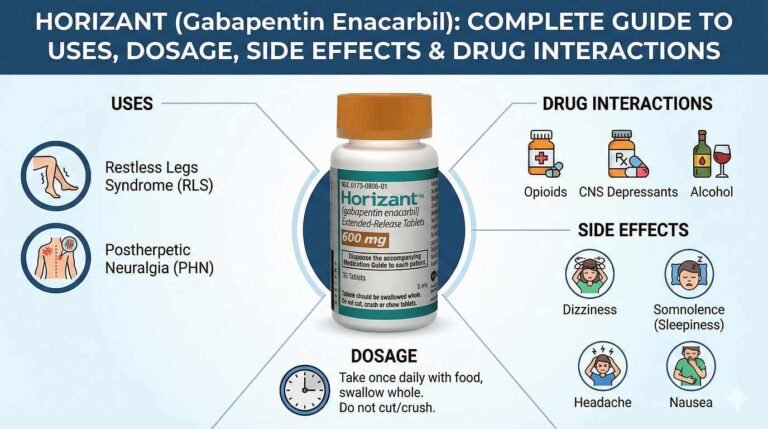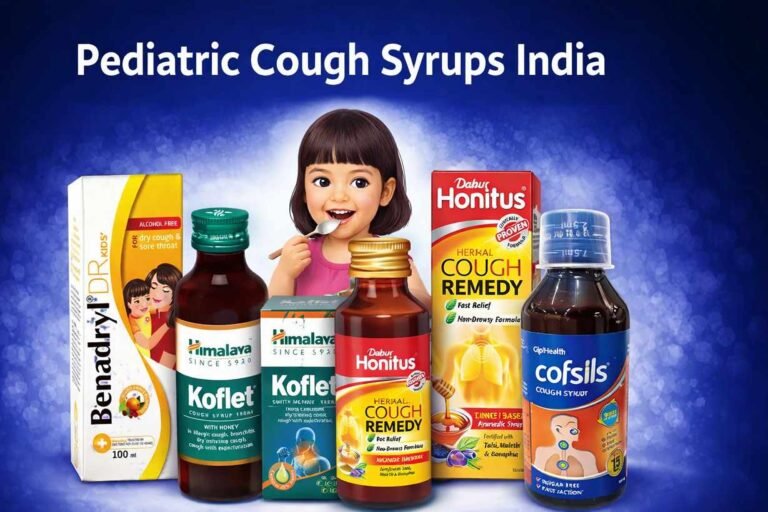A persistent cough affects millions of Indians annually, disrupting work, sleep, and daily life. While many cough syrups line pharmacy shelves, choosing the right one depends on understanding one fundamental distinction: what type of cough you have.
This is not a ranking of “best” syrups—it’s a strategic guide to selecting the correct syrup for your specific condition. Wet coughs and dry coughs require fundamentally different active ingredients. Children’s formulations prioritize safety over potency. Choosing incorrectly wastes money and delays relief.
This comprehensive guide breaks down the science, compares 40+ brands across categories, and helps you navigate the pharmacy with confidence. Whether you’re managing a productive wet cough, an irritating dry cough, or treating a child, we’ve structured this guide to get you to the right answer in 5 minutes.
Jump to your condition:
N DRY COUGH: REAM MORE

How to Instantly Know Which Cough Syrup You Need
The first step is diagnosis. Answer these two questions:
Question 1: Is your cough productive (with phlegm) or non-productive (dry)?
A productive/wet cough brings up phlegm, mucus, or sputum. It often sounds “chesty” and feels like something needs to come out. This requires expectorants—medicines that thin and loosen mucus so you can cough it up more easily.
A non-productive/dry cough is harsh and scratchy, producing no mucus. It often worsens at night and feels like throat irritation. This requires cough suppressants—medicines that reduce the cough reflex itself.
Question 2: Who is taking the syrup?
- Adults: Full-strength formulations with maximum efficacy
- Children (6-12 years): Reduced-strength with safety-optimized ingredients
- Young children (Under 6): Highly restricted options; consult doctor first
- Pregnant women: Specialized formulations avoiding harmful ingredients
Decision Matrix:
| Your Condition | Recommended Approach | Go to This Guide |
|---|---|---|
| Wet cough + Adult | Expectorant-based (Ambroxol, Guaiphenesin) | Wet Cough Guide |
| Wet cough + Adult + Wheezing | Expectorant + bronchodilator (Ambroxol + Salbutamol) | Wet Cough Guide |
| Dry cough + Adult | Suppressant-based (Dextromethorphan, Doxylamine) | Dry Cough Guide |
| Any cough + Child (6-12y) | Child-safe formulations (reduced strength or herbal) | Children’s Guide |
| Child under 6 years | Avoid self-medication; consult pediatrician | Children’s Guide |
| Pregnant woman | Prefer expectorants or herbal syrups, avoid suppressants | Children’s Guide |
Still not sure? If you can produce phlegm, it’s wet. If not, it’s dry. When in doubt, consult your doctor before purchasing.
Why Different Cough Types Need Different Medicines: The Medical Explanation
Understanding how cough syrups work helps you make smarter decisions. Coughs exist for a reason—they’re your body’s defense mechanism to clear airways. The key is choosing a syrup that aligns with the cough’s purpose, not against it.
Wet Cough (Productive Cough) – The Problem:
When you have bronchitis, a cold, or pneumonia, your airways produce excess mucus to trap and expel the infection. A wet cough is your body working correctly. The problem is the mucus is too thick to cough up easily, so it lingers and worsens symptoms.
The Solution – Expectorants:
Expectorant medicines like Ambroxol and Guaiphenesin work by thinning mucus, making it easier to cough up. They don’t suppress the cough; they improve it. You’ll cough more initially, but the cough will become more productive and resolve faster. This is why doctors recommend staying hydrated when taking expectorants—fluids help further thin mucus.
Commonly used expectorants in Indian syrups:
- Ambroxol: Mucolytic agent that breaks down mucus molecules
- Guaiphenesin: Expectorant that increases mucus hydration
- Bromhexine: Mucolytic agent (older, less commonly used now)
- Carbocisteine: Mucolytic that also reduces mucus viscosity
Dry Cough (Non-Productive Cough) – The Problem:
A dry cough typically follows viral infections (like COVID-19 or flu) or allergies. There’s no infection to clear; instead, your throat’s nerve endings are irritated and hypersensitive. Coughing produces nothing and worsens throat pain and sleep.
The Solution – Suppressants:
Cough suppressants like Dextromethorphan and Doxylamine target the cough center in the brain, reducing the reflex itself. These are appropriate only for dry coughs because suppressing a productive cough traps mucus and worsens infections.
Commonly used suppressants in Indian syrups:
- Dextromethorphan (DM): Mild suppressant with good safety profile
- Doxylamine: Antihistamine with mild suppressant effect
The Critical Rule: Never use expectorants for dry coughs (you’ll be promoting mucus production that doesn’t exist). Never suppress a productive cough (you’ll trap infection).
Combination Syrups – Pros & Cons:
Many syrups combine expectorants + suppressants. This can be problematic because the two work against each other. Some are justified (expectorant + decongestant + mild pain relief), but expectorant + suppressant is contradictory.
Ingredient Quality Matters:
Indian pharmaceutical regulation ensures all approved syrups meet safety standards. However, brand reputation correlates with:
- Research investment in formulation
- Manufacturing quality controls
- Consumer satisfaction rates
- Doctor recommendations
Quick Reference: Cough Syrup Categories & Top Brands in India
This table helps you navigate the landscape. For detailed reviews of each category, visit the specialist guide.
| Cough Type | Best Active Ingredient | Example Brands | Dosage (Adults) | When to Use | Full Comparison |
|---|---|---|---|---|---|
| Wet Cough | Ambroxol + Guaiphenesin | Ascoril, Mucolite, Cofsils | 10-15 mL, 3× daily | Bronchitis, cold, chest congestion | → Read Full Guide |
| Wet Cough + Wheeze | Ambroxol + Salbutamol | Ambrolite, Ftox-AM | 5-10 mL, 2-3× daily | Productive cough with bronchospasm | → Read Full Guide |
| Dry Cough | Dextromethorphan | Benadryl CR, Tixylix, Coughfree | 10 mL, 3-4× اليومية | Post-viral dry cough, throat irritation | → Read Full Guide |
| Dry/Allergic Cough | Herbal/Natural | Himalaya Koflet, Dabur Honitus | 5-10 mL, 3× daily | Natural relief, allergic cough | → Read Full Guide |
| Children (6-12y) | Expectorant (reduced strength) | Honitus Kid, Asvin’s Asvitus | 5 mL, 2-3× daily | Child-safe expectorant relief | → Read Full Guide |
| Children (6-12y) | Herbal/Natural | Himalaya Koflet L, Baidyanath | 5 mL, 2-3× daily | Natural option for sensitive kids | → Read Full Guide |
Note: Always read individual product labels for current dosage. This table is a reference guide, not a medical prescription. Children under 6 should consult a pediatrician before any cough syrup.
ALSO READ: Pharmaceutical Formulation Plants for Sale in North India
Understanding the Active Ingredients: A Pharma Breakdown
When reading labels, you’ll see various ingredients. Here’s what each does:
Expectorants (For Wet Coughs):
- Ambroxol: A metabolite of Bromhexine. Increases mucus hydration and airway clearance. Effective within 4-6 hours. Well-tolerated with minimal side effects. Most popular in modern Indian syrups.
- Guaiphenesin: Increases secretions and hydration of mucus. Requires adequate water intake. Has been used safely for decades. Often combined with Ambroxol for dual action.
- Bromhexine: Parent compound of Ambroxol (less commonly used now as Ambroxol is the active metabolite).
- Carbocisteine: Direct mucolytic reducing mucus viscosity. Alternative to Ambroxol; both are effective.
Cough Suppressants (For Dry Coughs):
- Dextromethorphan (DM): Synthetic opioid-like compound without addiction potential. Works on cough center in medulla. Safe, effective, minimal side effects. Preferred for non-productive coughs.
- Doxylamine: Antihistamine with mild sedative properties. Helps suppress cough and allows sleep. Contains alcohol in many formulations (check label if avoiding alcohol).
Bronchodilators (Added for Asthmatic Component):
- Salbutamol (Albuterol): Beta-2 agonist that relaxes airway muscles, easing breathing. Often added to expectorants when bronchospasm (airway tightness) accompanies productive cough.
- Levosalbutamol: Isomer of Salbutamol with potentially fewer side effects. Found in newer formulations.
Antihistamines (For Allergic Coughs):
- Chlorpheniramine: First-generation antihistamine reducing histamine-driven throat irritation. Causes drowsiness.
- Cetirizine: Non-drowsy antihistamine; found in some allergy-related formulations.
Decongestants (For Nasal Congestion Component):
- Phenylephrine: Reduces nasal congestion accompanying coughs.
- Pseudoephedrine: Stronger decongestant; sometimes avoided due to hypertension concerns.
Herbal/Natural Ingredients (For Mild/Chronic Coughs):
- Honey: Natural antimicrobial and throat soother. Base ingredient in many herbal syrups.
- Tulsi (Holy Basil): Immunomodulatory herb reducing inflammation.
- Liquorice: Anti-inflammatory, soothing to throat.
- Ginger: Natural anti-inflammatory and cough suppressant.
Reading the Label Tip: Look at the first three ingredients—these are present in the highest concentration. If the first ingredient is sugar or glucose, the syrup is more of a sweetened liquid than a therapeutic formulation.
Decision Framework: Choose by Your Specific Situation
Beyond “wet vs. dry,” consider these factors:
1. Duration of Cough
- Acute cough (less than 2 weeks): Usually viral. Wet coughs benefit from expectorants; dry coughs from suppressants.
- Sub-acute cough (2-4 weeks): Could be bacterial (needs expectorant) or allergic (needs antihistamine + suppressant).
- Chronic cough (more than 4 weeks): Requires doctor evaluation. Syrups may provide symptom relief but not cure.
2. Associated Symptoms
- Fever + cough: Likely infection; expectorant better for wet, suppressant for dry.
- Runny nose + cough: Allergy-driven; consider antihistamine-containing syrups.
- Wheezing + cough: Bronchospasm present; seek syrup with bronchodilator (Salbutamol or Levosalbutamol).
- Chest pain + cough: Severe; see doctor before self-medicating.
3. Lifestyle Constraints
- Working 9-5: Some syrups cause drowsiness (doxylamine-based). Choose non-drowsy options.
- Driving/operating machinery: Avoid antihistamine-heavy syrups.
- Pregnant: Avoid most suppressants; expectorants or herbal syrups are safer. See specialist guide.
- Breastfeeding: Most expectorants are safe; some suppressants are not.
4. Budget Considerations
- Premium brands (Ascoril, Crocin): Higher R&D investment; often more consistent formulation.
- Mid-range (Cofsils, Honitus): Good balance of efficacy and cost.
- Generic/value brands: Same active ingredients but lower marketing cost; effective if made by established manufacturers.
Recommendation: Choose by active ingredient first, brand reputation second, and price third. A cheaper syrup with the right ingredient beats an expensive one with the wrong one.
5. Special Populations
For detailed guidance, refer to our specialist guides, but quick rules:
- Under 6 years: Doctor consultation essential. Many syrups are contraindicated.
- Age 6-12: Use child-specific formulations. Adult dosages can be harmful.
- Elderly (65+): Often have comorbidities requiring caution. Doctor consultation is wise.
- Pregnant women: Expectorants generally safer; many suppressants are contraindicated.
Common Side Effects & When to Stop
Most cough syrups are well-tolerated, but awareness helps:
Common (Usually Mild) Side Effects:
- Drowsiness: From antihistamines or doxylamine. Not a problem if taken at night.
- Dry mouth: Some syrups have drying effect; increase water intake.
- Mild GI upset: Nausea, diarrhea, or constipation. Usually passes after a few doses.
- Headache: Rare but reported; often resolves by day 2-3.
Serious Side Effects Requiring Doctor Visit:
- Allergic reaction: Rash, swelling, difficulty breathing. Stop immediately.
- Severe dizziness/confusion: Especially in elderly. Stop and consult doctor.
- Rapid heartbeat or chest pain: Especially with bronchodilator-containing syrups. Seek emergency care.
- Persistent vomiting: Syrup not being tolerated.
Drug Interactions to Be Aware Of:
- Antihistamine syrups + alcohol: Increases drowsiness.
- Bronchodilator syrups (Salbutamol) + stimulants: May cause jitteriness.
- Dextromethorphan + SSRIs/MAOIs: Risk of serotonin syndrome (rare but serious).
When to Stop Using and See a Doctor:
- Cough persists beyond 3-4 weeks
- Cough is accompanied by fever, weight loss, or blood in sputum
- Breathing becomes difficult
- Child’s condition worsens despite treatment
- Any allergic reaction occurs
Safety Tip: Even natural/herbal syrups can interact with medications. If taking prescription drugs, inform your doctor or pharmacist about any syrup you’re considering.
Explore Detailed Guides for Your Cough Type
We’ve created comprehensive specialist guides for each scenario. Below are summaries; click the links for full comparisons, brand reviews, and ingredient-level analysis.
Best Cough Syrup for Wet Cough (Full Guide)
Productive coughs with phlegm require expectorants. Our wet cough guide compares 15+ brands including Ascoril, Mucolite, Ftox-AM (Laafon Galaxy), Cofsils, and others. It includes dosage recommendations, ingredient analysis, price breakdowns, and expert tips for maximizing effectiveness through hydration and steam inhalation. Best for bronchitis, chest congestion, and viral infections with productive symptoms.
Best Cough Syrup for Dry Cough (Full Guide)
Non-productive dry coughs require suppressants or herbal relief. Our dry cough guide reviews 12+ brands including Benadryl CR, Tixylix, Coughfree, Himalaya Koflet, and Dabur Honitus. It covers ingredient differences between chemical suppressants and herbal alternatives, effectiveness for post-viral coughs, nighttime cough management, and when to add throat lozenges to your regimen. Best for coughs following flu/COVID, allergic coughs, and post-nasal drip-driven coughs.
Best Cough Syrup for Children (Full Guide)
Safety is paramount for children. Our pediatric guide covers age-specific recommendations (6+ years), child-safe brands like Honitus Kid, Asvin’s Asvitus (reduced strength), Himalaya Koflet L, and Baidyanath formulations. It includes dosage by age, ingredient safety profiles, and guidance on when syrups are inappropriate and other treatments are better. It also covers pregnancy-safe options for expectant mothers.
Frequently Asked Questions (FAQ)
What’s the difference between wet and dry cough syrups?
Wet coughs have phlegm and need expectorants (Ambroxol, Guaiphenesin) to thin mucus for easier coughing. Dry coughs have no phlegm and need suppressants (Dextromethorphan) to reduce the cough reflex. Using the wrong type can make coughs worse.
Can I use children’s cough syrup as an adult?
Yes, but it’s inefficient. Children’s syrups have reduced active ingredient concentrations. Adults need full-strength formulations for therapeutic effect. However, if an adult wants a milder option, children’s syrup is safe; just adjust expectations about effectiveness.
How long can I use cough syrup safely?
Short-term use (up to 1 week) is safe for most syrups. Beyond that, persistent coughs warrant doctor evaluation. Some syrups can be used longer under medical supervision, but chronic coughs indicate an underlying condition needing diagnosis.
Is Ftox-AM (Laafon Galaxy) good for wet cough?
Ftox-AM contains Ambroxol + Terbutaline, making it suitable for productive coughs with bronchial spasm. It thins mucus (Ambroxol) while relaxing airways (Terbutaline), providing dual action. Dosage is typically 5-10 mL twice daily for adults, but always follow the pack or your doctor’s advice.
Are herbal cough syrups as effective as chemical ones?
Effectiveness varies. Chemical suppressants (Dextromethorphan) are faster for dry coughs. Herbal options (honey, tulsi, liquorice) work more slowly but may suit those preferring natural ingredients. For urgent relief, chemical syrups are typically more effective. For maintenance or mild coughs, herbal works well.
Can pregnant women use cough syrup?
Most expectorants are relatively safe during pregnancy. Many suppressants are not recommended. Herbal syrups with honey and tulsi are generally safer options. Always inform your obstetrician before using any cough syrup.
Why do some cough syrups contain alcohol?
Alcohol acts as a preservative, flavor enhancer, and sometimes provides mild sedative effect. If avoiding alcohol for personal, medical, or religious reasons, check the label—many modern formulations are alcohol-free.
How long does it take for cough syrup to work?
Most expectorants work within 4-6 hours of the first dose. Suppressants typically work within 1-2 hours. Herbal syrups may take 6-8 hours or longer. For acute nighttime relief, suppressants are usually the fastest.
Can I mix cough syrup with other medicines?
Cough syrups are generally safe with most medicines, but some ingredients can interact with blood pressure drugs, antidepressants (SSRIs/MAOIs), or heart medicines. Always inform your doctor or pharmacist about your existing medications before starting a cough syrup.
What should I do if cough syrup doesn’t work?
If a correctly chosen syrup (wet/dry matched) doesn’t help within 3 days, see a doctor. Persistent coughs can indicate bacterial infections, asthma, allergies, GERD, or other conditions that require prescription treatment rather than OTC syrups.
Making Your Final Decision
Choosing the best cough syrup is straightforward once you understand your cough type and needs. The decision framework in this guide eliminates guesswork:
- Identify if your cough is wet (phlegm-producing) or dry (throat-scratching)
- Match to the appropriate ingredient type (expectorant or suppressant)
- Consider special factors (age, pregnancy, medications, lifestyle)
- Consult our specialist guides for detailed brand comparisons within your category
A ₹100 syrup with the right active ingredient will always outperform a premium brand with the wrong one. Focus on matching the cough mechanism with the pharmacology of the syrup, not just the brand name.
For detailed product comparisons, dosage protocols, and brand reviews within your specific category, explore our specialist guides:
→ Best Cough Syrup for Wet Cough (Read Full Guide)
→ Best Cough Syrup for Dry Cough (Read Full Guide)
→ Best Cough Syrup for Children (Read Full Guide)
If your symptoms persist or worsen, always seek professional medical advice—cough syrups are tools, not cures.
Medical Disclaimer & Review
Disclaimer: All information on this site is for educational purposes only and should not be used for diagnosis or treatment without expert medical advice. The advice of a qualified medical practitioner should always be sought.
Reviewed by;

Dr. Yogesh Chaudhary (B. Pharma) Senior Pharmacist at S.N. Medical College, Agra-(UP)
References
- CDSCO Official: https://cdsco.gov.in/
- Ministry of Health & Family Welfare: https://www.mohfw.gov.in/
- DGHS CDSCO: https://dghs.mohfw.gov.in/cdsco.php
- Cough Syrup Safety Press Release: https://www.mohfw.gov.in/?q=en%2Fpress-info%2F9356
- FDA OTC Monograph M012: https://www.accessdata.fda.gov/drugsatfda_docs/omuf/monographs/
- FDA Children’s Cough Safety: https://www.fda.gov/consumers/consumer-updates/should-you-give-kids-medicine-coughs-and-colds
- FDA Codeine Restriction: https://www.fda.gov/drugs/drug-safety-and-availability/fda-drug-safety-communication-fda-restricts-use-prescription-codeine-pain
- FDA Contaminated Cough Medicine Alert: https://www.fda.gov/drugs/drug-safety-and-availability/fdas-actions-protect-children-contaminated-cough-medicine
- WHO Cough & Cold Guidelines: https://www.who.int/publications/i/item/WHO_FCH_CAH_01.02
- WHO Good Pharmacopoeial Practices: https://www.who.int/docs/default-source/medicines/norms-and-standards/guidelines/quality-control/trs996-annex1-who-good-pharmaco
- WHO Medical Product Alert (Oct 2025): [https://www.who.int/news/item/13-10-2025-medical-product-alert-n-5-2025–substandard-(contaminated)-oral-liquid-medicines]




